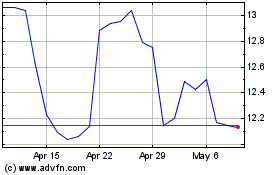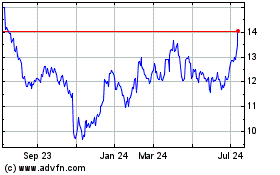Today's Top Supply Chain and Logistics News From WSJ
August 01 2017 - 7:23AM
Dow Jones News
By Paul Page
Sign up: With one click, get this newsletter delivered to your
inbox.
The Saint Laurent fashion house is giving up some control over
distribution in China in hopes of reaching deeper into the market.
The French luxury retailer will use an agreement with a new online
platform to expand in China's rapidly growing domestic market, the
WSJ's Matthew Dalton reports. The brand will sell merchandise on
the new joint venture platform created by Farfetch and JD.com,
China's second-biggest e-commerce company, in a cautious foray into
China's freewheeling internet market. That's a significant step
because luxury firms have been reluctant to sell over the internet
in China because of concerns that JD.com and Alibaba Group Holding
Ltd. run marketplaces riddled with counterfeit goods. But Chinese
consumers account for 30% of global luxury spending and are
increasingly shopping at home. Saint Laurent believes an online
strategy will help them reach those customers, particularly outside
the big cities, without risking overexpansion of its stores.
Aluminum may not be turning into the new steel, after all. Auto
makers are stepping up their use of aluminum as they look for
lightweight alternatives to the heavier sheet metal in many
vehicles, but the WSJ's Chester Dawson reports that search is
giving way to a patchwork of materials as a fundamental part of the
automotive supply chain is bent into new configurations. Aluminum
has enjoyed a surge as auto engineers have shaved weight from
virtually every component amid tighter emissions standards. Ford
Motor Co.'s shift in 2014 to aluminum for the best-selling F-150's
body panels was seen as a tipping point because sales and
production volumes of Ford's truck are so high. Producers are
responding, however, with moves to new materials including
magnesium and carbon fiber, and steelmakers have rolled out
stronger but lighter steels. That's slowed the growth of some
aluminum producers, but auto parts providers like Arconic Inc.
insist the drive to aluminum will continue even if the pace slows
down.
Boeing Co. is taking more complete control of critical pieces of
its aircraft manufacturing supply chain. The jet maker is creating
a unit to develop and build aircraft avionics systems, the WSJ's
Doug Cameron reports, moving more deeply into the electronics
behind planes as the company expands its strategy of insourcing key
technology to cut costs. The move takes Boeing further into the
territory of big suppliers, following its push to get more involved
in the aftermarket service and maintenance business of big engine
providers. Boeing says the new avionics unit is being established
in consultation with suppliers. The action sent shares in some of
those suppliers into decline, however, a sign of unease over the
steep changes that are underway in aerospace supply chains. Boeing
is hoping to reduce costs with more vertical integration of its
manufacturing, but the actions may also provide more control of
production and a tighter grip on revenue from its aircraft
sales.
TRANSPORTATION
Commodity-focused companies are looking stronger, although not
entirely because of a turnaround in underlying business. The past
year has seen mining, energy and other commodity businesses lead a
surge in corporate bonds that have reached investment grade, the
WSJ's Tatyana Shumsky reports, in part because those companies have
slashed costs, sold assets and cleaned up balance sheets. Energy
and basic materials businesses accounted for 85% of the bonds
moving into to Bank of America Merrill Lynch's high-grade index,
opening those companies to lower-cost borrowing. The change
illustrates how swiftly the fortunes of commodity companies have
turned as they focused on restraining supply and then benefited
from a rebound in resource prices and a stronger global economy.
Companies like natural gas exporter Cheniere Energy Partners L.P.
now are looking to push more business through global distribution
channels as they gain firmer financial footing.
The founder of National Air Cargo is fighting to keep his job
and to keep the airline in operation. Christopher Alf, chief
executive of the military transport specialist, is asking a
bankruptcy court judge to dismiss calls for his ouster, the WSJ's
Katy Stech reports, arguing that a series of past legal problems
won't get in the way of his efforts to turn the company around. Mr.
Alf's plea is part of a bankruptcy-court battle for control of one
of the few independent U.S. air cargo airlines remaining in a
business roiled by consolidation and changing shipping patterns.
Aircraft provider Global BTG LLC is trying to wrest away the
business after winning a $10 million judgment against the carrier
in an aircraft-leasing dispute. The leasing company says the case
is the result of a broader pattern of mismanagement, an accusation
Mr. Alf says is built on unproven and irrelevant charges. National,
like others tied to military contracts, is still facing diminishing
business as the U.S. moves to wind down operations in the Middle
East.
QUOTABLE
IN OTHER NEWS
A gauge of China's manufacturing activity fell more than
expected in July, a likely sign of a slowdown in the world's
second-largest economy. (WSJ)
America's largest companies are on pace to post two consecutive
quarters of double-digit profit growth for the first time since
2011. (WSJ)
Manufacturing growth fueled by export demand helped push
Mexico's economic growth to o.6% in the second quarter. (WSJ)
The eurozone's unemployment rate fell to its lowest level in
more than eight years as the inflation rate remained low. (WSJ)
Dutch brewer Heineken NV posted higher profit in the first half
of the year, helped by big growth in low-alcohol drink sales in
Europe. (WSJ)
Truck drivers handling cargo at Toronto Pearson International
Airport are reporting long delays amid a strike by Swissport ground
crews. (Today's Trucking)
Japan's big three container shipping lines reported strongly
improved results in the past quarter as they prepare to integrate
their businesses. (The Loadstar)
Seaspan Corp. co-founder Gerry Wang is stepping down as chairman
and chief executive of the container ship leasing business.
(American Shipper)
Growing container shipping concentration is bringing carriers
closer to a "nirvana of sustainable profitability," Drewry Shipping
Consultants Ltd. says. (Port Technology)
The ambitious clean-air program at California ports depends on
truck technology that hasn't been developed and will be expensive
to implement. (Long Beach Press-Telegram)
United Parcel Service Inc. is expanding its alcohol-shipping
services to include more international ordering and transport
capability. (Post & Parcel)
A Pennsylvania company will ship 700,000 tons of coal to Ukraine
in a deal the Trump administration says is a move to undercut
Russia. (Bloomberg)
The Baltic Exchange will close its Baltex electronic trading
platform for freight brokers by the end of the year. (Lloyd's
List)
Net profit at Dubai-based logistics provider Aramex rose 15% in
the second quarter after eliminating one-time investment costs.
(Supply Chain Digital)
An unnamed group paid $62 million to buy a warehouse property in
California's North San Jose area, near Silicon Valley. (Business
Journals)
E-commerce growth in Germany is expected to slow in coming years
as the share of consumers buying goods online plateaus.
(eMarketer)
ABOUT US
Paul Page is deputy editor of WSJ Logistics Report. Follow him
at @PaulPage, and follow the entire WSJ Logistics Report team:
@brianjbaskin , @jensmithWSJ and @EEPhillips_WSJ. Follow the WSJ
Logistics Report on Twitter at @WSJLogistics.
Write to Paul Page at paul.page@wsj.com
(END) Dow Jones Newswires
August 01, 2017 07:08 ET (11:08 GMT)
Copyright (c) 2017 Dow Jones & Company, Inc.
Ford Motor (NYSE:F)
Historical Stock Chart
From Aug 2024 to Sep 2024

Ford Motor (NYSE:F)
Historical Stock Chart
From Sep 2023 to Sep 2024
